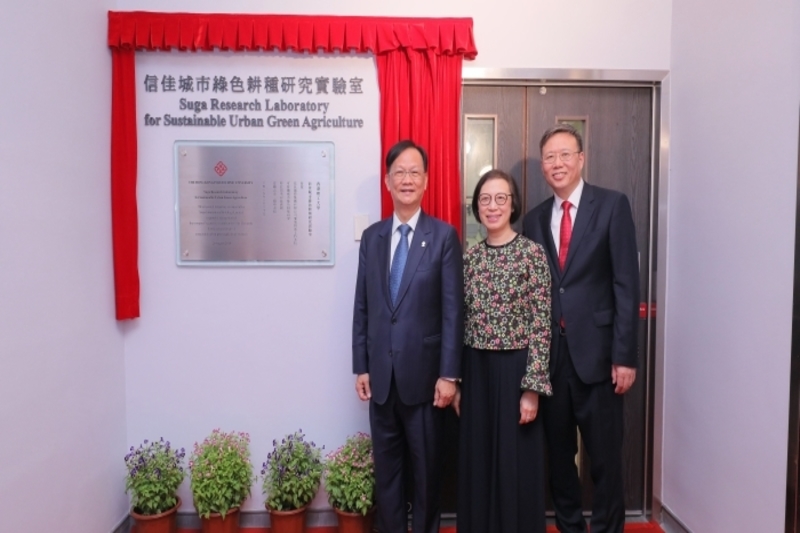
The Hong Kong Polytechnic University (PolyU) received funding to establish Hong Kong’s first research platform focusing on urban agriculture – the Suga Research Laboratory for Sustainable Urban Green Agriculture.
The Secretary for Food and Health of the HKSAR Government officiated the naming ceremony on 21 August 2019 along with the President of PolyU.
Aspiring to serve as an information hub to make greater contributions in urban agriculture development in Hong Kong, the Greater Bay Area and the Mainland, the Laboratory will help foster a “Healthy Eating” culture and safeguard public health.
The mission of the Laboratory is to develop the next generation of Urban Agriculture model to cultivate high quality and safe fruits and vegetables in a small indoor space, with hydroponics as a focus.
The two research directions include the investigation of the optimal correlation between major environmental factors and the growth of hydroponics vegetables, as well as the systematic assessment of food safety risk, harmful chemicals and food-borne bacteria in vegetables grown from hydroponics and traditional farming.
The support for PolyU’s sustainable urban green agriculture research was welcomed and appreciated. It was noted that the Laboratory is the first of its kind in Hong Kong.
With the use of innovative technologies, Urban Agriculture contributes to food safety and enables sustainable food production in modern cities. It matches with one of PolyU’s strategic research areas, that is, food safety and technology.
In 2011, PolyU established the first university-based Food Safety and Technology Research Centre in Hong Kong and had successfully developed the first Food Hygiene Standard Certification System for local catering establishments, which had then been licensed to three major certification bodies in Hong Kong.
The government has also put in a lot of efforts and resources to promote the sustainable development of agriculture in Hong Kong.
This includes the setting up of an Agricultural Park to encourage the adoption of modern farming methods and offering funding through the $500 million Sustainable Agricultural Development Fund to foster the research and application of new technologies as well as to encourage farmers to upgrade and modernise their equipment.
The establishment of the Research Laboratory at PolyU is welcomed and seen as a complement to the Government’s efforts on this front.
The inventive solutions that will arise from this laboratory, and how they will bring meaningful contributions to the advancement of hydroponic business and pet food business in Hong Kong are eagerly anticipated.
Run by PolyU’s Food Safety and Technology Research Centre (FSTRC), the Suga Research Laboratory for Sustainable Urban Green Agriculture will be customer-focused.
The Executive Director of FSTRC shared that the development of indoor hydroponic technology is demand-driven to ensure that the products would fulfil the needs of Hong Kong people.
Besides food safety and technology for humankind, the Laboratory will conduct research on pet food in the near future.
The Laboratory will also establish a Core Technology Exchange Platform for promoting knowledge transfer in Urban Agriculture and enhancing the competitiveness of the industry.


















